Introduction
Bishop Josiah’s early years were recorded in a booklet written and published by Dr Denis M’Passou in 1979 entitled Josiah Mtekateka – from Priest’s Dog-boy to Bishop. This is included in the chapter on his life at https://donaldardensreflections.org/
As the cost of using the internet in Malawi is so high, a book containing both Josiah’s early life and Donald’s appreciation is being published in Malawi.
Election as Bishop
Donald writes.
I knew little of Josiah though we had met briefly during my visit to SW
Tanzania in 1962. Although only thirteen years older than me, I felt like a child beside him. He married in 1925, while I was a nine-year old schoolboy. He had thirteen children, we had one. He was immensely tall and totally dedicated to his work.
Elective Assembly
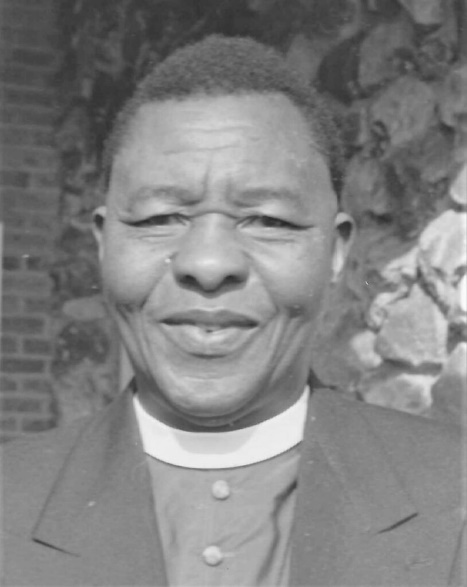
On 6 December 1964 an Elective Committee of the Diocese of Malawi unanimously recommended to the Diocesan Standing Committee – that Josiah should be the suffragan bishop of Malawi. Everyone made it clear that we wanted him to be bishop of a new diocese as soon as funds could be found for buildings and staff.
I wrote to Josiah at once. He took my letter to Bishop John Poole-Hughes who lived 150 miles away at Liuli on the lakeshore. Josiah then heard for the first time that the clergy of SW Tanzania also wanted him as their suffragan.
“Why didn’t you tell me?” he asked. “I was Josiah Mtekateka
you are not a citizen of Tanzania I was afraid you might not be acceptable to them.” Josiah agreed to go into retreat for three days of prayer. He then made up his mind. He would go to Malawi. Bishop John was genuinely sorry and gave him his blessing and the cross and ring that he had bought for him. Joseph Mlele became suffragan of SW Tanzania in August 1965 and nine years later their diocesan bishop.
Consecration 1965
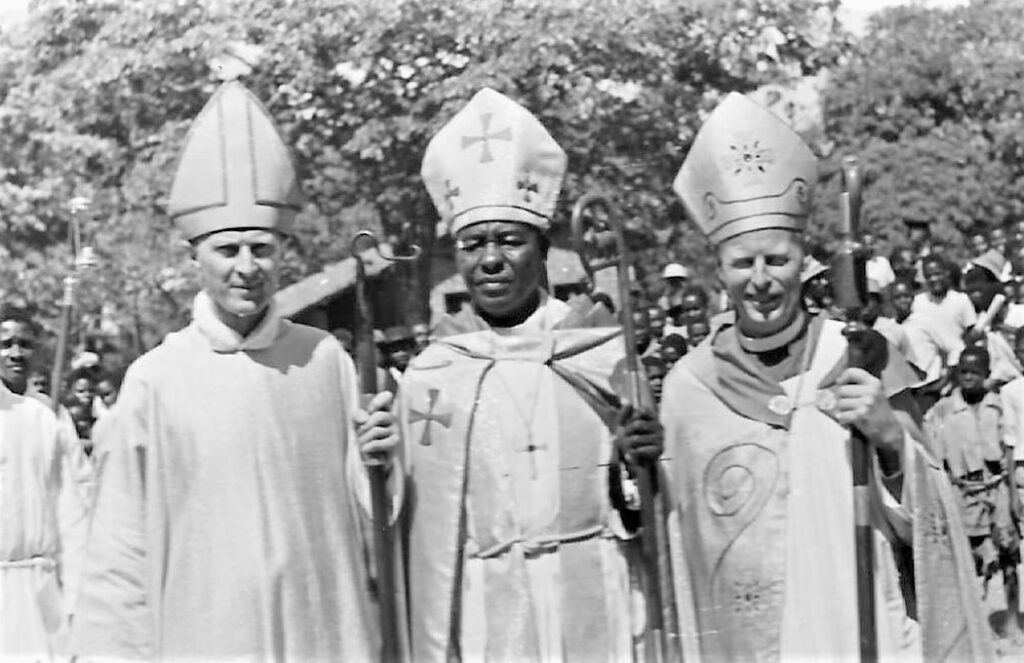
Archbishop Oliver Green Wilkinson, Josiah Mtekateka, Donald Arden
On 27 May 1965, Ascension Day, Josiah Mtekateka was consecrated Bishop in Likoma Cathedral by Archbishop Oliver Green Wilkinson of Zambia before a congregation of 5,000 inside and outside the building. Those present included the two Catholic bishops from the regions where Josiah would be working, Bishop Jobidon of Mzuzu and Bishop Fady of Lilongwe, both French; the heads of all three Presbyterian synods; Sir Glyn Jones, the Governor General and bishops from Southern Rhodesia and Zambia from the province of Central Africa.
Bishop Frank Thorne had come from Tanzania to take Josiah’s retreat. The address at the consecration was given by Cecil Alderson, Bishop of Mashonaland in Southern Rhodesia. He spoke in fluent Chinyanja, though he had probably hardly heard a word of the language in the thirty years that had gone by since he was briefly a missionary on Likoma Island in the early 1930s.
Travels through Malawi 1965
Josiah stayed three months with us, based at Malosa. After which we spent five weeks travelling together 900 miles in the Central and Northern Regions. Between us we confirmed 1,104 teenagers and adults. The people were delighted for the first time to have a bishop born and bred among them. At some of the new congregations the services had to be held out of doors as they could not fit into the buildings. At others there were eager faces of boys peering in at the windows. We were even able to show George Carlisle from Texas a parish bigger than any in his home state; we spent ten days in it and still did not visit all its congregations. The needs were overwhelming; half the children were sitting under mango trees instead of being in classrooms.
A health centre was 100 miles from the nearest doctor. Most of the clergy had no room in which people could speak to them in private. Despite this the church was vibrant and growing. In four parishes we confirmed between them more than there had been in Nyasaland ten years earlier. In the most lively parishes, three quarters of those confirmed were adults. I had never seen this before in my 21 years in Africa. So many goats were given to Josiah that we had to set up sub-stations for them, goat-pens where they could find bed and breakfast till he could come and collect them.
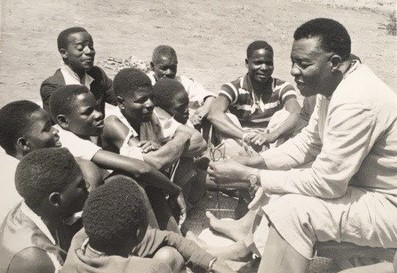
Josiah sharing his Christian faith
On 21st September, St Matthews Day I celebrated the Eucharist in the little church of Nkhunga, north of Nkhotakota, in which we had been sleeping the night before, to celebrate the 25th anniversary of my ordination as a priest in 1940. A minister of the Synod of Livingstonia and the paramount chief had come to visit us the evening before so we invited them to receive communion with us. I felt it made a new start for the next 25 years of my ministry in an increasingly no-Christian world which would have to be more ecumenical. We finally got back to Nkhotakota on Friday but had to leave two hours later for four days in Chia Parish which is always invigorating. We began with a brand new congregation in a forest then another congregation only three years old inland from Chia Lagoon, 45 confirmed, nearly all adults. Half the congregation was outside peering through the window slits.
Chongoni
Then on to Chongoni, the only permanent church built since I came to Malawi and almost the only one in the diocese, apart from the ‘European’ ones in the townships and Soche. I celebrated facing the people, as it has a proper free standing alter. Dedicated it to St Christopher. They had brought in benches from the school but put them all on the men’s side of the church. I said, “Perhaps I have come to the wrong building. Is this the new mosque?” They took the hint and shared the benches out 50:50.
We slept by the lagoon and the first sound when we woke up was of bombs being dropped on a lakeshore village in Mozambique, 32 miles across the lake. It reminded me of the London blitz. In the afternoon we went on to Salima. About 250 people, Roman Catholics, CCAP, Muslims and Anglicans, had come for a confirmation in a tiny church that could not have held 60, so we headed out of doors in a dust-storm that had been blowing for two days and had already drowned one fisherman.
Josiah was 62 when he became Bishop and I did not expect him to be able to cope with this demanding job for more than a few years. In an area twice the size of Wales there were no tarred roads, other than a couple of streets in Lilongwe and a mile or so in Mzuzu, built to take Elizabeth, the Queen Mother from the airstrip to her house for the night. From Nkhotakota, where Josiah was to be based, if you headed south, you would inevitably meet a washed-away bridge; if you went north, you came to the Bua River after with only a canoe for crossing. It you went west, you met a mudslide in the rainy season. And east was the Lake where there was only Ilala going north one week and south the next. The diocesan headquarters was just a block of three small rooms, now the primary school office. With no complaints and huge courage, Josiah kept up a vibrant ministry until Peter Nyanja succeeded him thirteen years later.
Refugees from Mozambique
It would be false to think of Josiah’s area of responsibility as a rural backwater. It was certainly undeveloped, without warning, Likoma Island, where Josiah grew up, 2,700 refugees poured into the island which is only three miles from the Mozambican coast, twenty minutes in a canoe, they were escaping from Frelimo fighting to remove the Portuguese. Its peacefulness has always been a home from home in times of crisis. They knew they would be accepted and cared for by the people of a barren island quite unable to feed its own 4,000 population. John Parslow was Dean of the Cathedral and superbly organised food and shelter from scanty resources. I managed to get £1,750 from Christian Aid to meet the emergency.
Josiah moved to Nkhotakota – 1966
In April 1966 Josiah moved to Nkhotokota. Originally it had been decided that the Bishop’s permanent house would be at the new capital of Lilongwe. This masked a big problem. On the lakeshore we owned ample land and we could build cheaply. In Lilongwe the cost of land and building was far beyond our resources. It was not until 1981 after we had left, that the diocese of Texas made possible the move to Lilongwe.
Getting to know Muslims
Most of the thirty thousand people in the vast ‘village’ of Nkhotokota were Muslims. A group of Swahili traders from the Indian Ocean settled in Nkhotokota in the 1840s. By 1900 it had become a thriving town of about 6,000 inhabitants. The Governor Harry Johnston described the third Jumbe in 1889 as a Swahili merchant prince. Most of his wealth came from the ivory trade. His hunters ranged all over Malawi. (Society of Malawi Journal 2/2006 p.15)
I was delighted when in 1966 Josiah asked me to find him a course to help him understand Islam better. As a result he and Joseph Chikokota, a priest from Namwera, went off on a two month course on “Islam and Christianity” in Mombasa, organised by the Christian Council of Kenya.
A few lines from Josiah’s report; They never wait for others when it is time to begin the service. That day four people started together including the sheikh but the prayers were led by one of his students. He asked for questions so we began:
“Why do Muslims not allow women or small children to pray in this mosque?”
When a woman is near you there is a third person who is a Satan who can lead you to other thoughts. Children are not allowed because they do not know the difference between cleanliness and dirtiness.
“What is Muslim belief about the Holy Spirit?”
Gabriel the Angel is the Holy Spirit.
“Why is a Muslim buried without a coffin?”
The human body was made from the earth and it has to go back to the earth facing Mecca.
“What about sharing inheritance?”
Yes, teaching is given and this is based on the Quran.
Josiah and Joseph gained greatly from the course. Two years later Joseph was offered a six month course on Islam at Ibadan in Nigeria which I encouraged him to accept. It had a lasting effect on his later ministry, even after his retirement to Malindi where the church was ministering to a small Chewa colony of Christians from Likoma rather than to the Yao and Muslim people who filled the school classrooms and the hospital beds.
Josiah and the Church in Kenya
Josiah had gone to Mombasa to study Islam but learned also from the church in Kenya. He wrote about freely giving:
“On Sundays they bring alms of two different kinds: first for their own church; secondly to help another church in their district. When I gave my collection, I was surprised to see notes and shillings in the container. They have two offerings on a Sunday. In addition, when our Lord’s Supper was celebrated those who received Holy Communion gave another collection at the door when they were going out. What I saw in those people was a happy willingness to give to God without grumbling.
On the last Sunday of our stay in Kenya we went to Mombasa Cathedral. It was filled to capacity with Africans. We knelt on the last bench at the back. They began collecting at the front; when they reached the back the bags were already full. Those Christians give willingly to God. The Treasurer told me that one Sunday’s collection would be enough for a priest’s monthly salary.”
Nyau Dancers at Malomo (March 1968)
Josiah and Archdeacon Sheldon Jalasi were visiting Chipata parish in the Ntchisi area accompanied by Bartolomayo Msonthi, our expert on the Chichewa used in our prayer/hymnbook Mapemphero, and Dunstan Ainani, later to be my successor. Josiah reported:
“At Malomo Father Ainani brought to me a village headman and his people he wanted to become Christians. These people were nyau dancers. They wanted to know what they would have to do if they became Christians. They had heard from other Churches that they could not be baptised in they continued dancing nyau. Father Ainani told them that there was nothing wrong with dancing nyau if it was danced as a traditional dance and not as a religion. The people were very happy to hear this and explained all they had heard from Nkhoma Synod and Roman Catholics. They did not think Father Ainani would answer them like this.
After a long and fruitful discussion people asked if they could become Christians. Father Ainani has now made them catechumens and they are being helped by Michael Michele from Malomo, three miles away. Michael works voluntarily and his service is worth recording in Ecclesia. This is the kind of lay leadership our church wants.
Malomo people are very happy and ready to make bricks for their priest’s house. They have made 12 brick moulds and hope to start work soon after the rains. Then, without consulting their chief, they showed us the place for building his house. The chief was angry but after they apologised, he cooled and is now very happy with the idea.”
We visited a Muslim village for confirmations and were happy to see 100 or more children outside the church who rushed to greet me. I thought what a wonderful service it would be to see those eager young faces packing the building. But when we began there were only 20 to 30 in the congregation. I asked the catechist: “Where are all the children who came to meet me?” “I sent them home – they are heathens.” My mind flashed back to the picture of Jesus picking up children in his arms: with one of the disciples saying to himself – “Doesn’t the master realise that these are heathen children?”
Lambeth, Birmingham and the USA – 1968
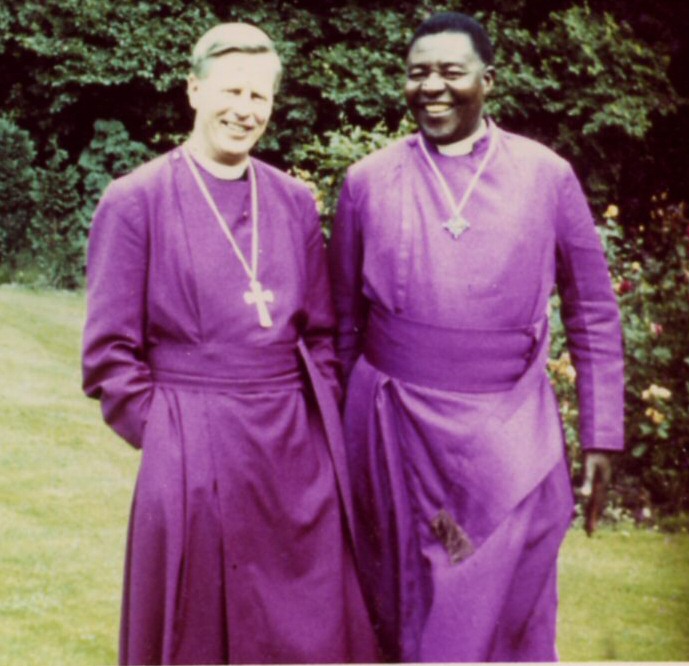
Josiah wrote:
“I was one of many to attend the Lambeth Conference for the first time. It was exhausting but very interesting especially for the opportunity of meeting and getting to know my brother bishops. Before the Conference I was one of five who made a pilgrimage to Holy Island and Lindisfarne. We had to walk barefooted for two and a half miles when we arrived.
At the Queen’s Garden Party there were some who stood all the time but had no luck in speaking to the Queen. I was one of those fortunate enough to reach the Queen and shake hands with her and later with Princess Margaret who was with Donald Coggan, the Archbishop of York.
After the Lambeth Conference Donald and I spent two weeks in Birmingham staying with Bishop George Sinker, the Provost of the cathedral. We visited many places, trying to thank them for all they have done and describing the work of the church in Malawi. In Birmingham for the first time I took part in consecrating another bishop, Paul Burrough, their chaplain for overseas people whom the diocese of Mashonaland had elected as their new bishop. Three days after arriving I conducted a confirmation in one of the Birmingham churches.
United States
In the United States I first of all stayed with Mr & Mrs Chindongo in Washington DC. She is my daughter. She is leaving Washington for Malawi because her husband is to enter Harvard University for three years to obtain his degree in Fine Arts.
When I arrived in Houston, Texas I was met by Bishop Milton Richardson, George Carlisle and others including the Mayor of Houston who gave me the key of the city. The garage which George Carlisle uses said, “You are not going to take a bishop round in your car, I am going to let you have mine – a Thunderbird which has never been used.” In my last week one of George’s parishioners wagged her finger at us. I asked George what she was doing. He said, “Don’t you understand? She is saying ‘You, a clergyman, supposed to be a poor man, driving a Thunderbird!’
At Waco I met Braz Walker. As the result of polio, he can move neither his feet nor his hands but he can type with his tongue, he had some sort of machine and showed me how he types. He is very interested in Lake Malawi fish and gave me a book with pictures of Malawi fish. In his room there were three tanks where he kept live fish. What struck me was the happiness he had, his face filled with joy. Really he is a wonderful man.”
Nursing Sisters of St John the Divine (NSSJD) (Nkhotakota 1970-1974)
For many years people had longed to have an Anglican Community of Sisters working in Malawi.
While in England in 1968 for the Lambeth Conference of bishops from around the world, Josiah and I visited the NSSJD sisters in London and won their hearts with Josiah’s description of our longing for a Community and the need for training midwives. In December 1968 we heard that the Nursing Sisters were having a week of special prayer to find out whether they were called to work in Malawi.
In February 1969 we heard “After a week of prayer the NSSJD Sisters have accepted Bishop Josiah’s invitation to establish a house at Nkhotakota, to take over the midwifery training school and to provide training for African novices for the community.
Josiah offered his own house for the use of the Sisters. The Mother Superior is Margaret Faith who worked as a UMCA nurse in Masasi Diocese in Tanzania.The first three Sisters will be Sister Mary who worked for 20 years in Namibia and Sisters Janet and Christine.
It is a great adventure of faith and it is wonderful that their skill and dedication will now be used to assist our girls in Malawi.
Their chief purpose is to make it possible for Malawian girls to serve God as Sisters. The Community accepts novices – trainees – only if they are trained nurses. To form a training school for Sisters we need a group of 3 or 4 young Malawian women. The Catholic Church in Lilongwe Diocese has over 130 African Sisters.
Please pray that by 1980 there will be Malawian Sisters of St John the Divine who are also qualified nurses.”
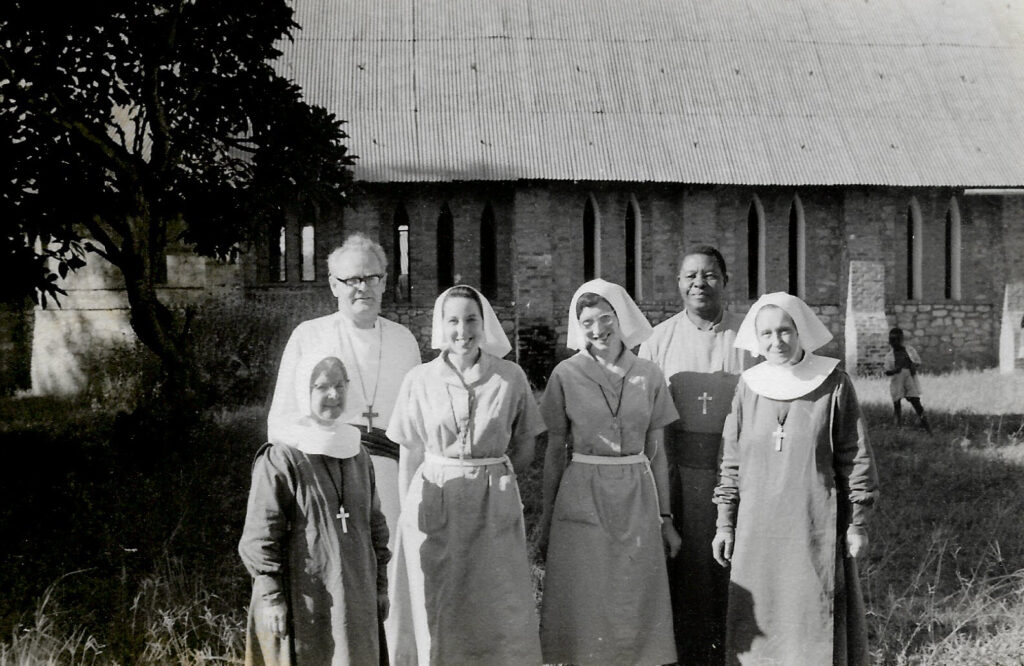
Bishop John How ACC with Sisters Mary, Christine, Janet, Margaret with Bishop Josiah
Bishop Josiah describes the Sisters’ contribution
We have had three ordinations where six men were made priests and one made Deacon. They were all held in churches which have had no chance of witnessing an ordination. At one of them the Reverend Mother of NSJDD was with us. She insisted on staying with us all the time under the hot sun of Africa. She also visited Likoma.
Sister Mary spoke at the Clergy Conference of the way God calls a person and how everyone feels that vocation in their heart. Of course, anyone can join any job they like but without God calling then it just cannot work at all. She urged the clergy to explain this well to their people and to pray to God that He may guide them.
In November 1972 Sister Christine, who had been Sister Tutor at St Anne’s Training School, was replaced by Sister Pamela who took over her job as Matron. Before joining the Community Sister Pamela worked for 15 years at the Charles Johnson Hospital in Zululand where she was Matron.Sister Janet had to leave for England because of health reasons and was replaced by Marion Palmer, a trained midwifery tutor sent by USPG.
In September 1974 Bishop Josiah reported:
“We are sorry to lose the two members of NSJDD who have just returned to their Mother House. Sister Pamela has been Matron at St Anne’s and Sister Mary has been responsible for the Community House and was also Bursar of St Anne’s Hospital. We thank them for their work.”
NSSJD leave for England
At the end of the year Bishop Josiah wrote in Ecclesia:
“The Sisters found they could not fill the gap after the ones who had left because of illness. There used to be three and when two went back to the UK they could only be replaced by one.
Although they only stayed in the Diocese for four years there has been a great improvement at St Anne’s Hospital. During their time work has increased as a result of the extensions. The Sisters were always cheerful and we thank them for their kindness in caring for visitors and for all they have done in this Diocese.
I hope they will still pray for a religious community to be founded in our Dioceses. Sister Mary has left one who is in her first training as a midwife. She has been giving her instructions of the work of a novice. I do not lose hope, let us keep on praying, God will call them and make provision when the time comes.”
Editor note: “Call The Midwife” later became a popular TV programme in the UK and covered the work of NSSJD.
Tireless visitor
Josiah was a tireless visitor. He wrote in 1970, “I recently visited three Nkhotakota parishes – Dwangwa, Liwaladzi and Buzi – and spent three days in each parish.” His message was that they were now grown up and on their own. “How was Jesus able to go round preaching? Did he give money to those who listened? It was the people who believed in him who produced the money. Judas was the treasurer and went round with a bag for the money.”
“Remember when he sent 70, two by two, what did he tell them? ‘Don’t take anything in your hands! The labourer deserves his wages.’
Even after his Ascension he left them without a penny, but the believers produced everything they needed. They even sold their houses and their farms and gave the money to the apostles.
Things are quite different from the time when the first missionaries came here. Donald is happy to be entertained by you and use your cups, your plates and your bathrooms.
“Raise your own money, pay your parish priest, put the balance in the savings bank – then you can use it for building better churches or putting a better roof upon your church. If your parish treasurer is not doing his work, find a better one.”
“I decided to go to Sani on Good Friday this year,” wrote Josiah. “Leonard Kamungu our first Malawian parish priest, was stationed in Sani before he went to Zambia where he was martyred. We went round the villages to mark his anniversary. Five people took part in preaching and others led the prayers. People were very happy. We had a very big cross, specially made, and this was carried by two people as Our Lord carried it with Simon.
I warned the Christians not to displease the Muslims by saying Muhammad is not a man to be followed. If we did, they would get angry and not allow us to preach. I said they should explain the meaning of the cross and why Our Lord was crucified and its outcome and why it is important to preach Christ who died on the cross.
In Nkhotakota Father Liwewe saw leaders of other churches so that they could do the same thing together in the town as he found it difficult. However, CCAP Christians, especially women, joined with Anglicans on Mother’s Day and in Christian Service Week and on the Day of Prayer for Unity and they all prayed together.
We should work together to preach to Muslims the Gospel of the Cross and its redemption. Please pray for us so that we unite and work together.”
Josiah elected Diocesan Bishop
“On 15 June 1971 the Provincial Standing Committee met in Lilongwe for the first time. Josiah was elected as the Diocesan Bishop of the newborn Diocese of Lake Malawi by 38 to nil. I wrote in Ecclesia:
His new diocese has more work going on than the whole of Malawi had in 1962, largely because of his tireless visiting while a Suffragan (assistant) Bishop.
In the 1960s only 9 of the 73 voters on the Provincial Standing Committee were “people of the land”. Now the province could be said to have come of age.
We also discussed a resolution at the Lambeth Conference of 1968 that families where husband and wife belonged to different churches should be free as far as the Anglican partner was concerned, to receive communion in either the wife’s church or that of her husband. At Lambeth this had been passed by a grudging 351 votes to 75. At Lilongwe the vote was unanimous.
It was at this meeting I was elected to be the fourth Archbishop of the Province of Central Africa (Botswana, Zambia, Zimbabwe, Malawi). I was installed the next morning in St Peter’s, Lilongwe.
The last action of the standing committee and one which was deeply appreciated was to recommend to all the dioceses that they should try to raise at least £166 to avoid cuts in Malawi clergy salaries. They added that they were wholly convinced that Malawi was doing everything in its power to increase its internal income and to reduce its expenditure in order to cope with the extraordinary drop in income from overseas it had been forced to absorb.
I ended my report to the diocese:
Before the meeting began, we read much in the newspapers about tensions and breakaways in the province. When we got there, we found only the Holy Spirit teaching us with some success how to speak the truth in love.
Nkhotakota – early days 1894
The Rev Arthur Fraser Sim was the first priest at Nkhotakota arriving in the middle of 1894 building himself a small house and a church. He built the first school which by March 1895 had 100 pupils. In September of the same year Bishop Chauncy Maples was drowned in the lake near Nkhotakota, Arthur Sim took his funeral, the body was placed in a grave in front of the altar in the church. A few months later Arthur Sim died of blackwater fever aged 34, his grave is outside the east end of the church. A large new church was dedicated to All Saints on 25 April 1902 and is now the Cathedral for the Diocese of Lake Malawi.
New Diocese of Lake Malawi 1971
The independent diocese of Lake Malawi was born on 1 October 1971 in a celebration at Nkhotokota attended by all the great and good – Bishop and Mrs Lawrence Brown from Birmingham; the Bishop of Ruvuma from Josiah’s former diocese in Tanzania and a team of 15 from Texas led by Bishop Scott Field Bailey who came with a pectoral cross made from material which had been to the moon and back.
Hospitality
Josiah never touched alcohol. He would however go to great trouble to provide a bottle of vermouth for visitors from another country such as my doctor brother Felix from Australia. Felix was acutely conscious that the mosquitoes of Nkhotakota, famed for their number and size, also carried malaria. Felix and I would sit on his khonde (verandah) for an hour or so, slapping mosquitoes and sipping vermouth until we could escape to the calm of his wife Alice’s excellent supper in their mosquito-proof house.
Travelling by car was a constant danger in the 1970s when Malawi was reputed to have the world’s highest accident rate. This was partly due to drivers who were inexperienced or drunk – a bar near us used to advertise “one for the road” but even more to the foreign engineers who were more concerned about drainage than safety. Josiah always had a competent driver but had two serious accidents in November 1974. His car overturned and was a wreck. Archdeacon James Lunda was unconscious for some hours but recovered without serious damage.
Josiah’s good friends in Texas replaced his car but a year later he reported another accident. “St Paul’s says, ‘Three times I was shipwrecked’ but he didn’t say whether he was injured. With me, twice I had car accidents. In the first I had a cut on my lower lip which was stitched and recovered quickly, but in the second I had fractures in both hands. I am now all right except for my left hand. Please join me in thanking Almighty God.”
Josiah was then 73.
Poor Clares – a community of Catholic nuns
Josiah was overwhelmed when Annabel Shaxson took him to join in the worship of the Poor Clare’s at their Lilongwe convent:
“The sisters came in singing with drums, visekese and mangolongonda (rattles and xylophones) with flowers in their hands and dancing majestically. I thought I was dreaming. The whole chapel was full of drumming and nthungululu (ululating). Then the priests in beautiful African robes came in – through the whole service they were singing and dancing. To me this seems the real African way of worship. It will take a long time in our church but the Roman Catholics have already done it.”
Josiah in Kadovu June 73
The newly ordained priest at Kadovu took me to a village I had never visited before where a small church had been built as a result of the determination of one man and his wife. They had been baptized by Canon Petro Kilekwa who came to Kayoyo after his return from Zanzibar in 1907.
When they moved to Katsika, the wife’s village, they found no Anglican church. So every Saturday they walked to Mshangano to attend church. They kept this up for a number of years and never missed a Sunday. They finally built their own church and the priest visited regularly.
Recently however the earth walls began to break up. They had no money for the repairs so they offered their goat to a man who agreed to do the work.
This month I am planning to institute Jack Biggers as archdeacon of Lilongwe, Peter Nyanja as priest-in-charge of Chia and James Lunda as archdeacon of Nkhkotakota.
Donald comments: Of these three, Peter Nyanja succeeded Josiah as bishop and Jack Biggers became the first bishop of Northern Malawi in 1995, James Lunda was flown to Johannesburg for a major operation before we left and made a good recovery.
After visiting Canon Mwenda in March 1973 to console him for his son’s death in Tanzania, long after dark Josiah was travelling to Ntchisi and found a bicycle abandoned beside the road. He stopped and a young man appeared “Why are you here?” I asked him. “I have just come down from that tree, my friend is still up the tree. As we entered the forest it was getting dark. Then we saw a very big animal beside the road. It was an elephant. We were frightened and threw our bicycle down and climbed this tree. We hoped to stay there until morning”.
They said they had stopped a lorry on its way to Ntchisi, but he refused. Their names are Kapalamula and Chimbeu Banda. As we were driving to Nkhotakota I remembered the parable of the Good Samaritan, particularly where the lawyer said, “But who is my neighbour?”
Josiah’s first synod August 1973:
His charge began: I welcome you! This synod will be in Chichewa. The archbishop at our joint synod in 1971 said: “The church is not something fixed and brought from Europe. Its way of following Christ is in the hands of the Christians of Malawi listening to the Holy Spirit who is building the Body of Christ in this country.”
“This means that we should not blink our eyes or look aside. We have accepted responsibility. They are handing it to us – a completely Malawian staff, save for a handful working in the hospital; the Nursing Sisters of St John the Divine (who were forced to leave a year later through shortage of numbers). The Diocesan Secretary, Doreen White, is training a Malawian, Alston Mazingaliwa, to take over when she leaves. Christ does not belong to missionaries or Malawians. He is with you and he is yours”
.
Cholera on the islands
Josiah wrote in April 1974
While I was visiting the islands it was the very same week that cholera broke out. As soon as the news reached the President he sent the Minister of Health, Makhumula Nkhoma, with medicine and staff to eradicate this communicable disease. I attended his meeting in which he explained how to protect ourselves against cholera – washing hands before food, drinking boiled water etc.
When we were ready on the beach to catch Ilala back to Nkhotakota none of us were allowed on board. Fortunately the government launch Edmund Rhodes was going back to Nkhata Bay and agreed to take me. It was 9pm. A few hours later I was awakened by the sudden hit of the boat against the jetty. I knocked on the door. There was no response. All of a sudden the boat hit the jetty again. I lost my balance and fell on three cartons of fish which protected me. One man got a big bruise on his forehead and nearly lost his fingers.
My car was waiting. We travelled all night and reached Nkhotakota at 3.30am on Thursday.
Exchange of visits April 1974
Josiah wrote:
“My visit to Kachebere catholic Major Seminary near the border with Zambia was a happy time. I was asked to preach at High Mass and Father Rodney Hunter, the Anglican member of their staff, made his oaths to me. There was a concelebrated High Mass and I was asked to preach. Fr Bernard Sharp, my Chaplain, was also there for a fortnight lecturing to the students.
We both returned to Nkhotakota with Bishop Kalilombe in his car. I was very happy to visit the seminary and I appreciated their cordial welcome. We were honoured by Bishop Kalilombe’s visit here to Nkhotakota. I hope that such cooperation and relationship will grow and become closer to promote unity between our churches.
Oil crisis 1974
By May 1974 the Arab oil-sheikhs and the sliding pound gave us a hard shove towards reality. In the Diocese of Southern Malawi in meeting after meeting we faced impossible deficits – Malosa School, the Diocese, Chilema – it was the same story everywhere. Costs from a nightmare world where a loaf of bread was a day’s wage and a bicycle a year’s wage. I wrote:
I do not want to speak about money but what we are learning from the lack of it. For years we have been talking about the time coming when paid catechists would be replaced by voluntary leaders. In past years we have looked to countries to the north of us as examples of self-support.
Now we need look no further than Lake Malawi diocese where under Bishop Josiah’s magnificent leadership all but two or three parishes have met in full the substantial quotas they undertook. Their diocese, which includes some of the least developed areas in Malawi, is going to contribute to the Christian Service Committee for self-help projects in backward areas.
In manpower the story was the same. In Lake Malawi key posts were being filled by Malawians. Dr.George Kumkwenzu was put in charge of all the medical work in Lake Malawi; Stanley Mandala was announced as the first warden of Nkhotakota Community Training Centre; Alston Mazingaliwa would understudy Doreen White as diocesan treasurer.
There was still a long, long way to go but the spirit was as infectious as that of St Francis who said, “It is in giving that we receive.”
Last Clergy Conference and retirement
Josiah’s last clergy conference was held in July 1977 and was attended by forty-one clergy, most of whom he had recruited and ordained himself. He then announced his retirement in November but in fact carried on ordinations and confirmations in both dioceses when his successor, Bishop Peter Nyanja and I were away for the Lambeth Conference of 1978.
Sermon at Consecration of Bishop Peter Nyanja – 1978
Peter Nyanja, Archdeacon of Nkhotakota, was elected to succeed Bishop Josiah and was consecrated at All Saints Cathedral, Nkhotakota on June 25th 1978. The preacher was Bishop Josiah and his sermon shows something of his own feelings about being a bishop.
He took his text from Acts 1.24. This refers to the apostles’ way of filling the vacancy in The Twelve caused by the suicide of Judas Iscariot. He went on to say “When Christians pray to God to “choose which one among these will take the place of so-and-so”, the answer does not come with thunder from heaven. It comes through those who after deliberation say, as the apostles said at Jerusalem, “It seemed good to the Holy Spirit – and to us – that so-and-so should be appointed to this office.”
This is the Lord’s choice. Many of us would not have chosen him – or anyone like him. Some of us wanted to be chosen bishop ourselves. Others wanted their friend to be chosen, or even one of their relatives. Still others would have liked someone “who looks every inch a bishop!” A man with an imposing personality, a deep penetrating voice, an enchanting smile and perhaps a handsome face as well.
But God does not answer prayers according to human wishes. “The Lord looks on the heart” – as he said himself when discussing the choice of a king for the Israelites. Our own wishes must die unless they are in conformity with the Holy Spirit.
Peter Nyanja’s election does not mean that he is the best person in the Diocese of Lake Malawi.
He may not surpass others in goodness, in intelligence, in ability – certainly not in stature! But he is the man God has chosen. Sometimes God chooses the weak to lead the strong; fools to lead the clever ones.
God does not choose those from the largest community – he chose Saul from the smallest tribe of Israel. He chose David, the youngest in his family. He chooses whom he likes and we must be grateful for his choice for he has our good at heart. God looks on the heart.
A choice made by the Holy Spirit may prove a failure, not because God makes mistakes – oh, no, he doesn’t! It may be because the person chosen becomes power-drunk and neglects or even abuses his responsibilities.
Saul was chosen by God, but because he did not stick to God’s guidance, God later rejected him.
Jesus Christ personally chose Judas Iscariot – and we all know what happened to him in the end.
So I say to the new bishop: “Stick to the Lord all the way and seek his guidance in all matters relating to your office.” This message is not for the new bishop only. Every Christian must see his calling as an election, that he or she has been called to serve the Lord. Saul, Jeroboam or Judas Iscariot – they all failed because they neglected their special callings and did what was right in their own eyes.
I have two words of advice:
My brother and successor, be humble and consider yourself unworthy of this high office. The call is not because of your worthiness; it is the gift of God.
Your new job is a heavy and difficult one. You will not be able to do it efficiently unless you depend on the Lord Jesus Christ and foster co-operation with all clergy and all laity.
A final word to you all – and of course to myself. We must not leave this heavy burden on our Bishop alone. Let us help him with our prayers, our moral and material support, and our co-operation.
People listened because this is what they had seen in his twelve years work in Malawi.
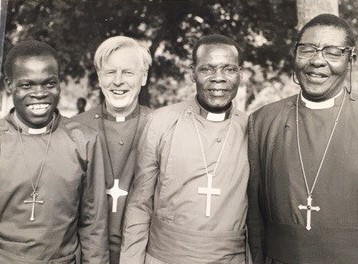
Bishops Peter Nyanja, Donald Arden, Dunstan Ainani, Josiah Mtekateka (1980)
Ardens leave Malawi 1981
An abiding memory will be the day of the farewell party at our house in Malosa in February 1981 just before we left Malawi, we were all startled to see a large government lorry coming up the drive. A beaming Josiah emerged saying he had asked a friend to bring him as he couldn’t possibly miss the party! It is my abiding hope that someone will write an adequate life story of this great man while memories are still fresh.
Visiting Likoma 2005
Jane and I visited Likoma in 2005 to share in the centenary celebrations of the Cathedral.
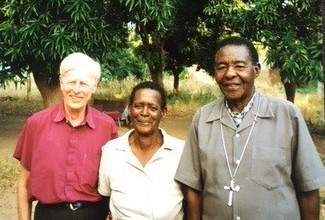
Donald, Alice and Josiah
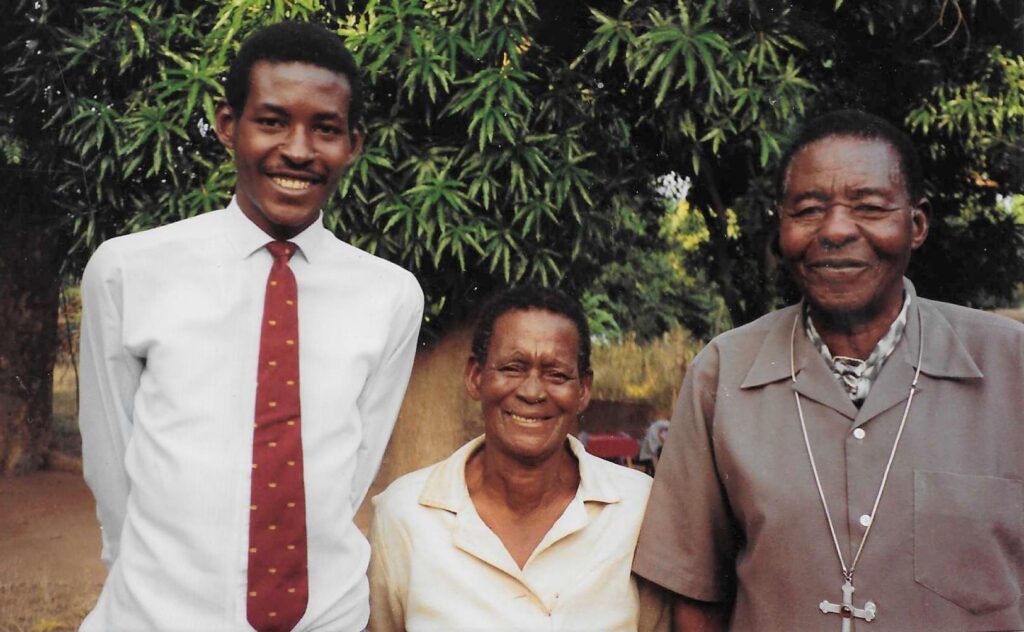
Leslie (Josiah’s son), Alice and Josiah
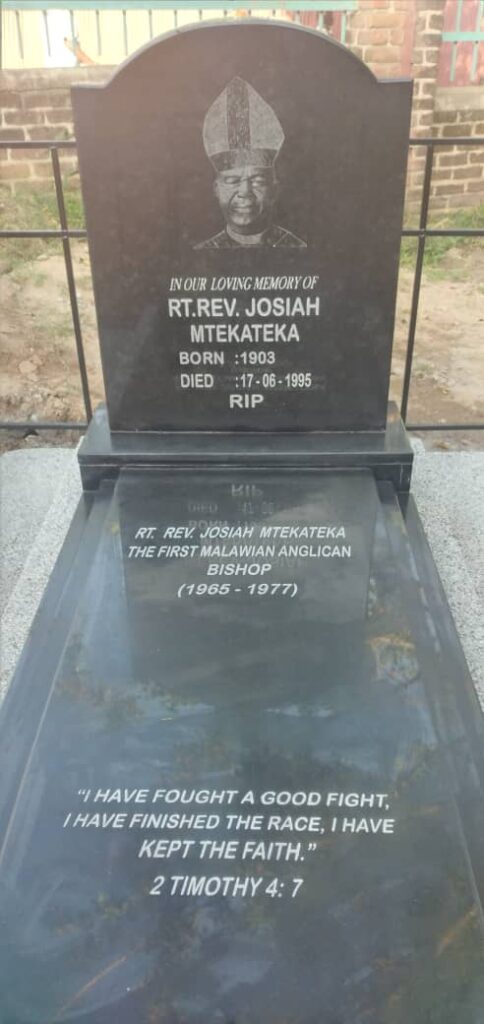
Josiah Mtekateka’s grave
beside St Paul’s Cathedral, Blantyre
Josiah Key Dates
1903 born on Likoma Island
1916 confirmed in St Peter’s Cathedral, Likoma
1921 entered St Michael’s Teacher Training College, Likoma
1925 married Maude, daughter of Stanley and Eveline Nambote of Likoma
1928 together with Edith How founded Malosa Secondary School taking an active part in building the chapel
1936 began training as a deacon, St Andrew’s College, Likoma
1939 ordained deacon in St Peter’s Cathedral
1941 returned to St Andrew’s to train as a priest
1943 ordained priest in St Peter’s Cathedral and started work in Chiluli in Tanzania
1957 represented Diocese of Southwest Tanganyika at UMCA centenary celebrations in England
1964 simultaneously in Diocese of SW Tanganyika and Malawi was asked to be Suffragan Bishop
1965 consecrated Bishop in Diocese of Malawi
1971 elected Bishop of new Diocese of Lake Malawi
1977 preached at consecration of Peter Nyanja, his successor in DLM
1996 died in Blantyre aged 93 and buried beside St Paul’s Cathedral
